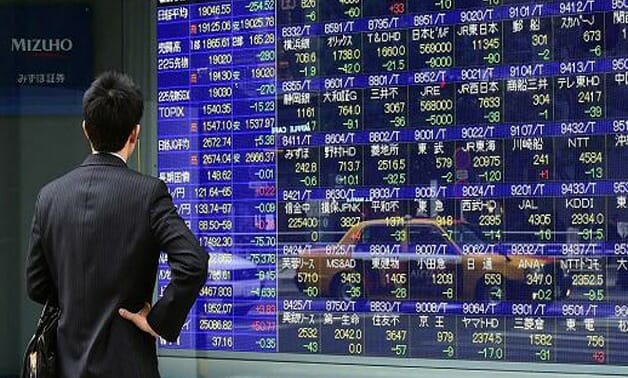Hong Kong, China — Equity markets rose Wednesday as investors weighed data showing the US economy remained resilient in the face of rising interest rates against the prospect of more tightening to bring inflation under control.
Wall Street popped higher Tuesday after a string of readings soothed concerns about a possible recession, while traders were also cheered by Chinese growth pledges.
However, reports that Washington could block the export of artificial intelligence chips to China weighed on sentiment.
US investors cheered news that a closely watched gauge of consumer confidence last month hit its highest level since January last year, while new home sales surged in May and orders for big-ticket manufactured items rose again.
The figures tempered fears that the world’s top economy could tip into recession because of more than a year of rate hikes, and lifted hopes the US Federal Reserve could still guide it to a so-called soft landing by also bringing inflation down to its two percent target.
President Joe Biden said on Tuesday that while economists had predicted a contraction was on the way, it still had not materialized.
“It’s been coming for 11 months, well guess what? I don’t think it is going to come,” he told a fundraiser, flagging healthy jobs growth and anti-inflation measures.
But National Australia Bank’s Rodrigo Catril pointed to “the theme of ‘sectoral recessions’ playing with different lags, making the Fed job to tame inflation harder”.
He pointed to the property sector now performing well after being the first to be hit by rate hikes, while manufacturing is in recession at the same time the services sector is growing.
“Meanwhile the resilience of the labor market and consumer are feeding, not detracting from, inflationary pressures,” Catril said. “Overall, the data is telling us the Fed needs to keep its foot on the tightening pedal.”
Weaker yen
Asian investors struggled to maintain Tuesday’s momentum in the morning but picked up the pace in the afternoon.
Tokyo, Hong Kong, Sydney, Singapore, Wellington, Mumbai, Wellington, Bangkok and Taipei all rose while London, Paris and Europe advanced in early trade. Shanghai ended flat but Seoul dropped.
Investors are now keeping tabs on a meeting in Portugal where speakers include top central bankers including Fed boss Jerome Powell and the heads of the European Central Bank, the Bank of Japan and the Bank of England.
On Tuesday, ECB boss Christine Lagarde said it was “unlikely” policymakers at the bank could state soon when interest rates had peaked and warned of yet another hike in July.
The BoJ is in focus as it stands by its ultra-loose monetary policy, even with the yen weakening on the back of expected Fed rate hikes.
The yen, which has lost almost 10 percent against the dollar this year and is at multi-year lows on major units, picked up slightly after Japan’s top currency official Masato Kanda said authorities will respond should there be excessive foreign exchange moves.
There is a feeling that officials will intervene to support the yen if it weakens too much, as they did in October last year when it hit a three-decade low of more than 150 to the greenback.
Oil prices ticked slightly higher but made little impact on the more than two percent losses suffered Tuesday on long-running worries about demand caused by ever-rising interest rates, and as concerns ease over Russian supplies after the weekend’s aborted uprising.
“With no visible interruption to Russian oil flows from the weekend political upheaval, prices are falling as oil markets return to focus on spot fundamentals, which have not changed,” said SPI Asset Management’s Stephen Innes.

